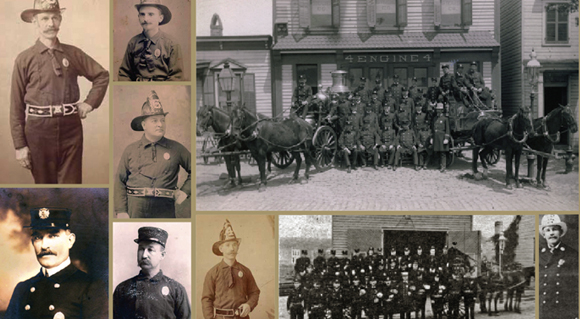What it was like, in the days when fires were fought by volunteers from each town before the City took over the Fire Department was exciting.
In Maspeth there were two fire companies, Hook & Ladder Company Number 5, which had its building on old Perry Avenue and Engine Company Number 4, which had two buildings. The first number 4 company was located at the present site of Laurel Venetian Blinds on Grand Avenue until the early 1900s. Then, a new building was constructed which was on Maspeth Avenue the site of the present Frank Kowalinski Post.
When I was a small boy, I can vividly recall being terrified by an incident, which occurred near the old Grand Avenue building of Number 4. As I was standing there on the street the doors of Number 4 suddenly flew open and out flashed directly at me the fire horses. Of course I was quickly out of the way but the fright is something I will not forget.
There was good reason for my being near the Firehouse as a boy. Philip Jones, Senior, my father, was the Battalion Chief and there was not much that went on around fires that I missed!
In the years before the City took over the Firehouses, Philip Jones Junior, grew up in Maspeth. In the house where his family lived there was a huge gong on the wall so that Philip’s father could hear it at any time there was a fire and get to the fire house to prepare to fight the fire. When the gong sounded at the Jones’ house, it also sounded at the homes of the fire wagon drivers so that at least Chief and drivers were sure to have notice. There was a siren on top of Sampson’s oilcloth factory which, provided the wind was blowing in the right direction, would sound a weird tone to summon the Firemen to come to the Company buildings and race to the fire. Sometimes the men would be late to the fire. If this happened, the latecomers would have to pay a 25-cent fine for each offense.
Philip Junior once he was old enough helped his family in their several business enterprises. At one time the family was engaged in the florist business near Mt. Olivet Cemetery. There was also the peddling concern, which young Phil worked at for a while, very profitably. Boxes of holly and crates of Christmas wreaths would be sold every winter. In the summer there were fruits and vegetables to be sold. The wagons used by the Jones had pictures of a colorful basket of fruit on their sides and the legend, “Jones is Here.”
On Thursdays, they went to the Fulton Fish Market to buy fresh fish for their route. The trip to the market was interesting and the actual start of the working day was 6 A.M. on Friday. The barns used by the peddler’s horses were on Remsen Street and Clinton Avenue. When the Jones had fruit to spare they gave it to Father Griffin at old St. Saviour’s Church on 58th Street; Christmas trees for the altar at Christmas and oranges and lemons for the festivals each year. Phil Jones’ parents were married at St. Saviour’s.
When Philip Junior was a man he joined the Fire Company at Number 5 on Perry Avenue. He found out how hard it was to hold the horses’ heads still after the fire gong sounded and they were anxious to be off. For the greatest efficiency, the harness was always suspended from the ceiling of the building above the animals’ heads and backs so that it could be lowered down immediately and fastened to the horses in position. But once the horses heard the gong they were impatient to run and often kicked holes through the front doors of the Firehouse before they could be gotten out on the road.
A few of the most memorable incidents that occurred while Philip Junior was in Company 5 were the time when the Huner Match Company in Evergreen burned. It was perhaps the “hottest” fire Maspeth Fire companies ever experienced. But the Number 5 Ladder wagon was in trouble this time. When the gong sounded only Philip and his friend Bill Burkhardt were in the Firehouse and as they left the Firehouse driving the horses Bill yelled to Philip that the horses were out of control! It seems that one animal had no bit in his mouth and was off in whatever direction he chose to run. By the time the men got the horses under control and got to the fire the match factory had burned to the ground.
The alarm system in Maspeth worked in the following fashion. There were several alarm boxes with glass panels over the alarm handle distributed around the town. When you had to report a fire, you went to the nearest box and noted the three locations printed upon it where the key to unlock the box could be gotten. (This procedure must have lost valuable time but it prevented false alarms.) When the key was obtained you returned to the box, unlocked the glass panel and turned in the alarm. A few other very “hot” fires in Old Maspeth were at Bassett’s Mill on Flushing Avenue near Creek Street and another when four stores on Calamus Avenue burned. Still another was when Philip and Bill Burkhardt heard the alarm for the fire at the old school house and as the wind was blowing strongly away from Maspeth the firemen did not hear the whistle on top of Sampson’s factory blow and Philip and Bill got no help with the blaze the school burned all day and nothing much could be done about it
Belonging to a Fire Company was a great honor in the old days with only the most popular and daring men of the town allowed to join. In the heat of a fire the men pulled down their leather covered helmets to shield their faces and plunged on with hose or axe into the thickest of the smoke or the hottest part of the blaze. There was great cold during the winter months when the back splash from the hoses wet the men and froze to their faces and hair numbed their fingers and feet inside their boots. In summer the heavy uniforms raised the men’s temperature beyond imagination. Those daring young men in the Fire Department were the elite of a brave era; the example of courage to inspire any small boy then and many a big boy now.



